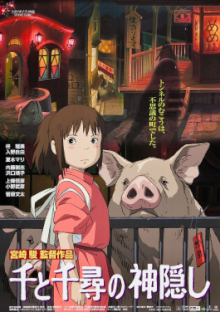As promised, I’m beginning my tour of the Studio Ghibli classics and this one was picked simply because it’s available on Netflix. My wife commented that she didn’t really like this when she first watched it. It was of course ridiculously successful and critically acclaimed, yet it is in essence one long, dream-like adventure in a fantasy world of pure imagination. The art and the magical world it conjures into being are outstanding and it’s amazing how the film keeps surprising you with every new character and scene. Still, as with all dream sequences, you eventually start to wonder whether any of this matters and what it all means. I found the themes of being kind and admonishing against greed and waste to be fairly light and Hayao Miyazaki keeps repeating the same tropes, even if he arguably pulled it off best here.
Ten-year-old Chihiro Ogino and her parents are moving to a new home and she is dispirited over having to make new friends and adjusting to a new place. While driving through a forest, her father takes a stony path that eventually leads them to a large building with a tunnel running through it. Her parents insist on exploring it and discover that it seems to be part of an abandoned amusement park. They wander through the empty buildings, decorations and shops, and finding a restaurant that seems stocked with food and yet is unmanned, her parents sit down to eat, saying that they will pay later. Chihiro refuses and goes off wandering herself. She runs into a boy named Haku who wears old-fashioned clothing. He warns her that she isn’t supposed to be here and that she is in danger. Returning to the restaurant, she is shocked to see that her parents have seemingly transformed into pigs and still greedily consuming the food there. Haku takes her to the large bathhouse at the center of the complex and she finds it is full of animals and spirits. It is run by a powerful witch named Yubaba and Chihiro must find a way to escape the spirit world she and her parents have become trapped inside.
Spirited Away was released in 2001 and in a way feels like the peak of traditional, hand-drawn animation. The character design, art style, fluidity of the animations, are all master-class and feel like such a breath of fresh air after being used to the 3D style that are prevalent today. It captures perfectly the sensation of being whisked away into a magical world in which the fantastic is normal and anything is possible. The huge bathhouse is the perfect example, with the boiler room being run by the spider-like Kamaji and his horde of little soot creatures who toil carrying pieces of coal, populated by a profusion of animals and demonic-looking creatures, and at the very top of the building lives the Yubaba, who is both a hag and a giant owl. In a way, it makes sense as there is some resemblance to human institutions and structures, yet it is also utterly fantastic, full of wonderful absurdities like a train whose tracks run just below the surface of a sea and a giant sludge monster who needs a bath. There’s something fresh and eye-opening in practically every scene, making this an incredibly entertaining spectacle.
As delightful as the world is, it’s never meant to very coherent and the film is all about the aesthetics rather than the worldbuilding. After a while it starts to feel like one random encounter after another with not much weight to anything that happens. Thematically, using pigs to symbolize gluttony is pretty standard and a sludge monster to represent pollution and trash is only slightly better. There are deep references to Japanese folklore of course and those mesh well with the Japanese themes of purity but it would take an expert to recognize specific elements. I can’t say that I feel much affection for Chihiro as a character. She feels like a stock Miyazaki character, her klutziness doesn’t seem endearing to me at all and the romance between her and Haku feels icky to me given that they are both supposed to be children. There’s some excitement and sense of peril at the beginning as we realize that Chihiro has accidentally wandered into a world that is not her own, but her kindness eventually wins over everyone just like every Miyazaki film ever and that’s just not very interesting.
I’ve never been a terribly huge fan of the Ghibli films and that might be because I caught them too late. I believe that this may well be the film that is most representative of Miyazaki’s style and it’s everything I thought it would be: imaginative, incredibly beautiful and reflective of Japanese sensibilities and aesthetics. Still it’s too nice and pleasant a vision to take very seriously and I have a deep aversion to ephemeral stories that pass by as if it were just a dream.

3 thoughts on “Spirited Away (2001)”